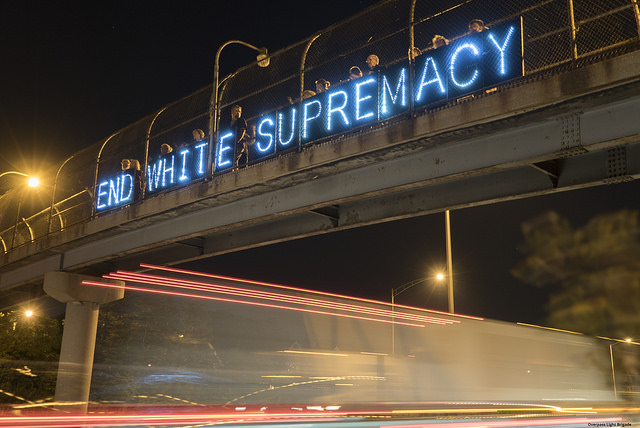What’s driving today’s polarization around race? And what’s the answer?
Two opposite answers—two narratives, if you will—are unfolding. One emphasizes systemic injustice and institutional racism. It views the problems black people face as sourced outside their community and attributes these problems to historic slavery and pervasive, systemic white oppression.
The other narrative emphasizes the importance of personal responsibility; evil is rooted in human hearts. Yes, white racism persists, but much bigger challenges confront the black community, challenges that can be overcome by the actions and decisions of black people in ways that are not ultimately dependent on the actions of white people.
Here’s the latest in our current series, A Dialogue on Racism and Christian Racial Reconciliation.
~
Dear Scott,
We remain encouraged that you have initiated a dialogue with us as fellow Christians even in the midst of significant tension. We respect you for this and appreciate the space you have created to hear our tone as one of brotherly love. We hope your readers also hear our deep affection for all the saints, both in our agreements and in our disagreements. Of course, there may be times we read too much into your views, and if so, we apologize in advance for where we misunderstand your intent.
Why an increase of sociological language and the reformation of American consciences?
The increase of sociological language is the result of a combination of factors, and we will list three: the witness of the marginalized church, the televising and recording of police brutality, and the social and educational need to answer why brutality keeps happening.
First and most important, the courageous and peaceful witness by people of color, especially the Black church’s witness, against White Supremacy has never allowed America to sidestep our horrific racializing sins. Their drumbeat has been loud and steady, and that prophetic truth has been eroding the Reconstructionist mythology of  America. This point cannot be overstated: Black folk of all stripes, Christians, scholars, historians, etc., since the very beginning of Reconstruction, bore witness to the rapid and ubiquitous way Northern and Southern society organized against Black families, churches, businesses, and towns. This Reconstruction revisionism is still prevalent in childhood curriculums today. America divested and terrorized the Black community, and we did it through “law and order.” Black Americans have never let us forget this, and since it was plain-as-day in the annals of American doctrine, there is no scrubbing this history.
America. This point cannot be overstated: Black folk of all stripes, Christians, scholars, historians, etc., since the very beginning of Reconstruction, bore witness to the rapid and ubiquitous way Northern and Southern society organized against Black families, churches, businesses, and towns. This Reconstruction revisionism is still prevalent in childhood curriculums today. America divested and terrorized the Black community, and we did it through “law and order.” Black Americans have never let us forget this, and since it was plain-as-day in the annals of American doctrine, there is no scrubbing this history.
Second, cameras really got rolling in the 50s, and the “law and order” violence done to Black citizens and peaceful protesters over the next 20 years was broadcast into every home. Imagine the millions of non-racist, good white parents, who all of a sudden couldn’t tell their children, “well, if those negroes would just stop committing crimes and vandalizing our property and having families, they wouldn’t have our hoses, dogs, and cops turned on them.” Just like the printing press, the near instant publication of events via television confronted our segregated consciences. This same stemming of the tide is of course occurring today, as all the world watches American peace officers kneel calmly and emotionlessly on the necks of the marginalized. When anyone watches these videos, the notion that our “law and order” is just erodes more and more, and an outraged curiosity is emerging and asking, “How is this possible? What shaped that peace officer’s deformed conscience? What shaped him to have no sense of his brutality, even a sense of duty and honor in his terroristic law-keeping?” It certainly was not an atheistic churning of history, or communitarianism.
Third, as Whites have begun to listen to the suppressed voice of Black and minoritized witnesses and have seen the brutality with their own eyes on a weekly basis, we are forced to ask why this happens. The only two institutional groups that have been carefully recording and analyzing why America is so unjust toward minorities have been communities of color and social scientists. So yes, critical theories have been incalculably important for the re-education of America and have provided the only institutional voice outside the Black community making racialized injustice plainly evident and calling for reprisal. While we would disagree with aspects of various sociological work, we view the discipline as a whole as a partner in the call for sweeping reforms. These are the main reasons, we think, your google search shows an increase in the language of systems and critical theories.
Critical Theories, Whiteness, and American History: shibboleth, or sibboleth?
You have often agreed that the Scriptures present a systemic and corporate sense of sin/injustice and also that critical theories expose cultural power structures. But then you take issue with the supposed atheism and anthropology of critical theory, which you describe as “focusing too narrowly on systemic injustice.” You continue with the claim that the only “cutting edge” redress is the Gospel, and finish with a concern about the livelihood of those who are accused of systemic racism. Throughout your response, it’s not that you are merely agreeing, with a few caveats. You seem to agree and then levy both contradictory as well as vague rebuttals of what we thought you’d already agreed with. In other words, who is your people? Who are you? Is it shibboleth or sibboleth?
Regarding your charge of atheism, we are now confused on what you believe. In multiple places you’ve agreed that Scripture acknowledges systemic and racialized injustice, but then you call it atheistic with “no basis for redemption” when it is applied to the White Supremacy of America. Your view, in our opinion, seems like a contradiction within a Christian worldview, and a misconstrual of the Academic practice of critiquing power structures.
In regards to a Christian worldview, you have agreed multiple times that Scripture presents systemic views of sin and justice. Additionally, in a Christian worldview, we have an ethic that exposes and confesses sin. Since critical theories specifically aim to expose the power structures embedded in human hearts and societies, then it is a tutor for the confession of personal and societal sin. Therefore, critical theories are a form of common grace, calling for confession and reprisal. In regards to the academic theory and practice of critical studies, the accusation of “atheism” is not germane. Social theories intentionally expose and describe, and they often scrutinize the way cultural powers use their own social theories to reinforce power, just as they do religious frames. The scrutiny of power, and especially the use of religion and faith in maintaining structures, has no necessary presupposition in atheism, even if some critical theorists are in fact atheists. We assume we do not need to provide a list of Christian-led atrocities to prove that “Christian worldviews” often do not seem to prevent systemic oppression. In other words, atheism is as relevant to our reception of critical theories as it is to our reception of a doctor’s medical care or the transport of an Uber driver. To say it positively, critical theories often sound like aspects of the protest of Prophetic literature, because they pronounce corporate sin similarly. It is no surprise then that even some of the most eminent critical theorists like Horkheimer have assessed that no other system has provided the sort of ethic of love that Christianity has, thus demonstrating a commonality between critical theories and Christian ethics.
… to be continued






